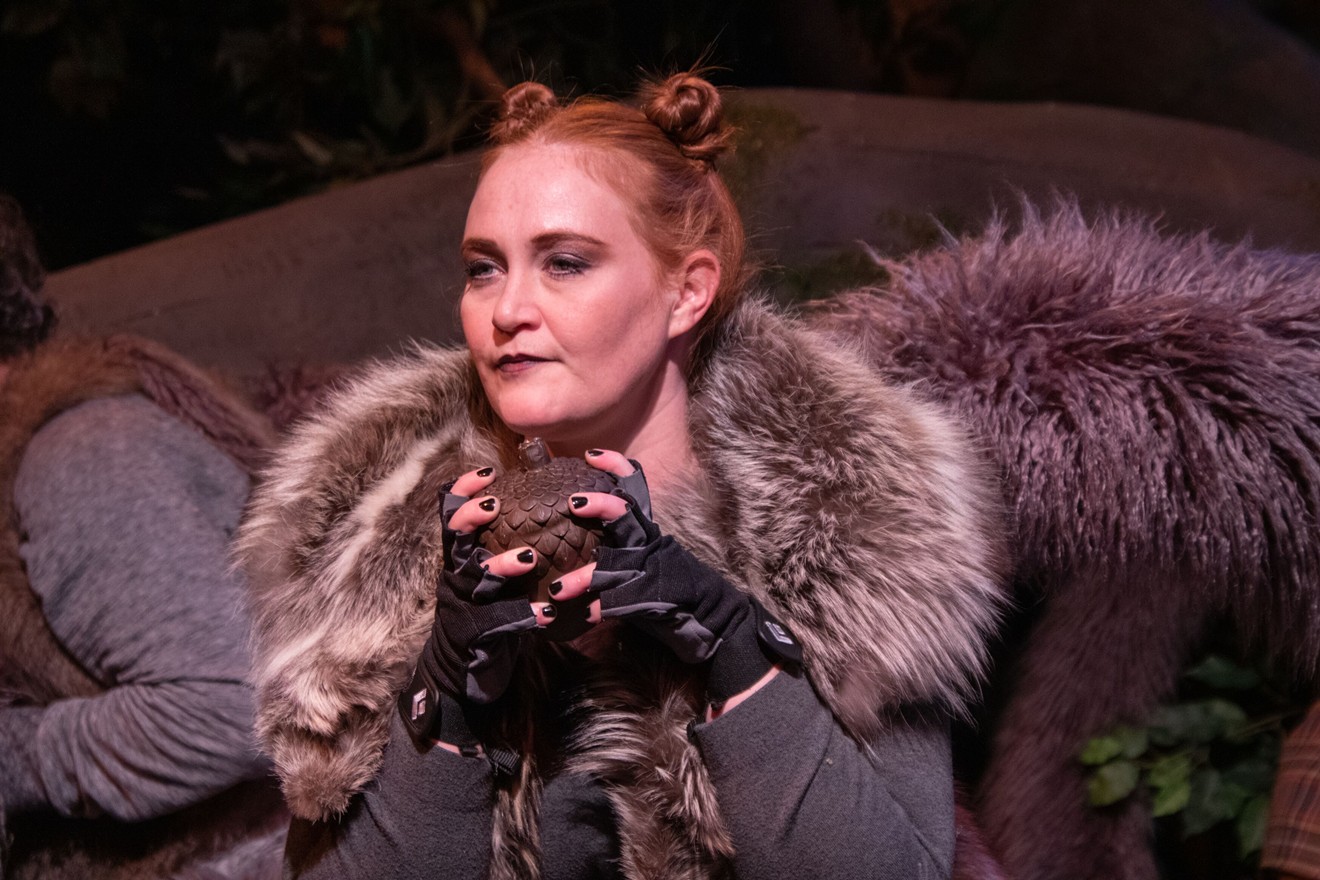Robert Askins is a daring playwright, as evidenced by Hand to God at Curious Theatre Company in 2016, when we watched a sock puppet created for a church children’s show become satanic, the church get defiled and everyone’s id spin crazily out of control. Askins's latest work, The Squirrels, is enjoying a regional premiere at the Aurora Fox, and it’s equally explosive. Executive producer Helen R. Murray is pretty daring herself when it comes to choosing material, and she’s enticed actor Missy Moore, who left Denver for a new life in Los Angeles, back to direct. On stage, Moore also tends to go full-out, and it’s doubtless her influence that makes the acting in this production as free and vibrant as the script requires.
Yes, this is a story about squirrels. Everyone in it is a squirrel. The actors wear squirrelly-human costumes with big, bushy tails, scamper around on a large, sheltering tree (a miracle of design and construction by Brandon Philip Case), emit squirrel squeaks, cheeps, mutters and chatters, and utilize a jokey, pun-laden language when speaking human. Askins has clearly boned up on squirrel behavior: Periodically, a scientist, played by Andrew Uhlenhopp, steps forward to tell us something about the nature of squirrels. So these on-stage squirrels behave like real squirrels. They’re territorial. They hide their nuts (some lewd jokes in the script here) in caches and sort them by type, which indicates a level of memory and intelligence. Squirrels can’t vomit. They’ve been known to be cannibalistic, and a male squirrel may kill infants that aren’t his.
But this play isn’t a nature lesson. As Aesop’s fables taught us long ago, animal stories usefully illustrate human traits. The Squirrels is billed as a dark comedy and is often very funny, but the overall impression it leaves is sinister, bloody and dark. Rather like the times we’re living in now, with wars that refuse to end or, having formally ended, continue to distort the lives of millions of people around the world.
In Askins's play, the squirrels’ territory is rapidly being diminished by fire and encroaching development. Food supplies are limited. The gray squirrels, led by paterfamilias Scurius (a fine Josh Levy) are surviving well enough at the base of their tree until red squirrel Carolinensis (Hossein Forouzandeh, in an equally strong performance) approaches. His people inhabit the branches above, and they’re hungry. Is Scurius willing to share some nuts from his ample store? Scurius is reluctant, but he’s persuaded to help by his compassionate wife, Mammalia (Kelly Uhlenhopp), and daughter Chordata (Leiney Rigg) — who, unbeknownst to him, is falling in love with Carolinensis. There are lots of echoes in this story. For some moments, I thought of Tevye in Fiddler on the Roof inviting a stranger to Sabbath dinner, only to find that stranger falling in love with one of his daughters. In The Squirrels, there’s a second daughter — Rodentia (Rachel Turner) — adopted by Scurius as a tiny pink fallen nestling. And here memories of King Lear intrude. If Chordata is a loving Cordelia figure, Rodentia is more akin to the scheming sisters Goneril and Regan.
Immigration is in the forefront for a while as Carolinensis is told that red squirrels don’t belong among the gray. Where was he born, he's asked —like so many Americans of Asian or African heritage. Here, he says simply, adding that the site has always been his home. Still, it seems that peace can perhaps be achieved between the two dominant males. Unfortunately, there’s an instigator in the squirrels’ midst: Sciuridae (also played by Andrew Uhlenhopp). It’s difficult to believe how much damage a single vicious whisperer can do, but not impossible. Think of Steve Bannon, dismissed as Donald Trump’s White House strategist and traveling to Europe to spread his dogma, chatting with Brexiteers in England and telling a gathering for Marine Le Pen in France, “Let them call you racist, xenophobes, nativists, homophobes, misogynists — wear it as a badge of honor.” Perhaps Bannon’s project is running into some headwinds, but his propaganda has power.
It isn’t hard for Sciuridae to convert pretty, nasty little Rodentia to his worldview. Turner’s Rodentia is so elegantly mean-spirited and Andrew Uhlenhopp’s Sciuridae so convincing that every time the two shared a scene, my stomach hurt. All the gentle sweetness of Rigg’s Chordata and Kelly Uhlenhopp’s nurturing Mammalia can’t counter Sciuridae’s malevolence, especially as father Scurius ages into dementia and obesity and Carolinensis struggles to protect his tribe. Pretty soon the dogs of war have been unleashed, and all hell is breaking loose.
If this fable has a moral, it’s that animals we think of as innocent and charming do things that we'd see as evil — and what they do is nothing compared to the evil that we human animals inflict on one another. This is a beautifully staged, thought-provoking and original fireball of a show.
The Squirrels, presented through February 9 by the Aurora Fox, 9900 East Colfax Avenue, Aurora, 303-739-1970, aurorafox.org.
[
{
"name": "Air - MediumRectangle - Inline Content - Mobile Display Size",
"component": "12017618",
"insertPoint": "2",
"requiredCountToDisplay": "2"
},{
"name": "Editor Picks",
"component": "17242653",
"insertPoint": "4",
"requiredCountToDisplay": "1"
},{
"name": "Inline Links",
"component": "18838239",
"insertPoint": "8th",
"startingPoint": 8,
"requiredCountToDisplay": "7",
"maxInsertions": 25
},{
"name": "Air - MediumRectangle - Combo - Inline Content",
"component": "17261320",
"insertPoint": "8th",
"startingPoint": 8,
"requiredCountToDisplay": "7",
"maxInsertions": 25
},{
"name": "Inline Links",
"component": "18838239",
"insertPoint": "8th",
"startingPoint": 12,
"requiredCountToDisplay": "11",
"maxInsertions": 25
},{
"name": "Air - Leaderboard Tower - Combo - Inline Content",
"component": "17261321",
"insertPoint": "8th",
"startingPoint": 12,
"requiredCountToDisplay": "11",
"maxInsertions": 25
}
]













